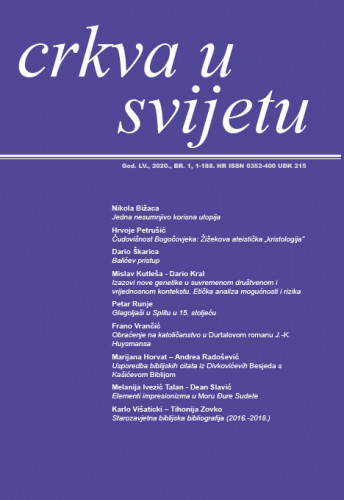Rad proučava suvremeni napredak na području genetike koji zahvaljujući velikim probojima u znanstvenom razumijevanju uloge gena u živih bića i razvoju (bio)tehnologije nudi nove primjene i mogućnosti na području zdravlja i poboljšanja čovjeka. U radu se nastoji ove napretke promatrati u suvremenom društvenom i moralnom kontekstu koji se često tumači i razumije kroz pojam postmodernizma. Priznajemo velike potencijale novih (bio)tehnologija, ali upozoravamo kako, budući da spomenuti kontekst ne nudi jasno definirane etičke standarde kao ni jasan koncept čovjekove prirode, postoji znatan rizik zloporabe tih (bio)tehnologija. Ti rizici najčešće se povezuju s ugrožavanjem slobode i jednakosti, a nerijetko se dovode i u vezu s pitanjima smisla i statusa čovjeka kao osobe. Dapače, nastojimo ukazati kako upravo problemi i nerazumijevanja na ontološkom području prethode društvenim neredima. Imajući to na umu, ne mislimo kako nove (bio)tehnologije po sebi stvaraju nove opasnosti, koliko imaju potencijal naglasiti one koje su već prisutne. Kako nova genetika intervenira u samu arhitekturu života, stavljajući je na raspolaganje ljudskim rukama, sam život bi mogao postati tržišna i manipulativna roba. Odgovor na te moguće zloporabe nije u odbacivanju novih (bio)tehnologija, nego u prepoznavanju nedvosmislenog statusa čovjeka kao bića koje je vrijednost u sebi i za sebe, a koju je nemoguće prepoznati ako se zanemaruje transcendentna dimenzija čovjeka.; This thesis paper examines contemporary advances in the field of genetics which, due to the vast improvement in scientific understanding of gene's role in the organism's life and development of various new biotechnologies, offers or promises to offer, new applications in healthcare and human enhancement which can be considered revolutionary. In this paper, we try to consider these advancements in contemporary social and moral context, most often understood through the term postmodernism. While we acknowledge huge potential benefits of these new biotechnologies, we argue that, since aforementioned contemporary context lacks clearly defined ethical standards and, furthermore, clear concept of human nature, there is a substantial risk of misuse of these biotechnologies. Most often, those risks are identified as being potential social risks concerning freedom and equality, but rarely are they thought in relation to the meaning or status of human person which is what we want to highlight. Furthermore, we identify exactly these problems as those that precede social problems. Having that in mind, we do not think that new biotechnologies create per se new hazards as much as they have potential to exaggerate those already existing. We present a thesis that, in contemporary context, new genetics is strongly influenced by market forces. Since new genetics intervenes in the architecture of life itself, giving it at human disposal like never before, life could become a commodity. We find that commodification of human life to be degrading for human person, which leads to gross abuses of personal and social values of human being. To counter those abuses, we believe the answer lies in having clearly defined as being the status of human person that has intrinsic value in itself, which is impossible without taking into account the transcendental value of human beings.
Sažetak

 Crkva u svijetu : 55,1(2020) / glavni i odgovorni urednik, editor-in-chief Mladen Parlov.
Crkva u svijetu : 55,1(2020) / glavni i odgovorni urednik, editor-in-chief Mladen Parlov.